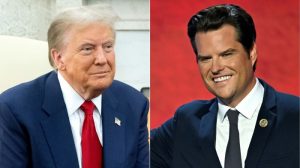how a written-off felon returned to rule America
In late May, walking out of the New York City courtroom where he had just been convicted of falsifying business records, Donald Trump railed against the judgment and said American voters would have the last word.
“This was a disgrace,” he said. “The real verdict is going to be November 5, by the people. And they know what happened here,” Trump said.
It took little more than five months for the 78-year-old Republican to make the journey from felon to president-elect, resoundingly defeating Kamala Harris and completing his own political rise from the ashes.
Trump’s standing was at its worst in the immediate aftermath of the January 6 attack on the US Capitol in 2021, when his approval ratings plummeted and he was impeached for his role in instigating the riot by his supporters to stop the peaceful transfer of power.
But even though senior Republican senators such as Mitch McConnell and Lindsey Graham condemned him, they declined to support his conviction in Congress’s upper chamber, which would have barred him from seeking office again.
It was that tiny window for a political comeback that Trump has ruthlessly exploited, armed with the enduring loyalty of a small entourage of aides and the conservative “Make America Great Again” faithful who never left his side.
Trump lay relatively low at his Mar-a-Lago estate in Florida for almost a year and a half after leaving office. But Republican figures — even senior ones such as Kevin McCarthy, then-House minority leader — came to visit.
The political pariah’s status hanging over Trump began to dissipate. He encouraged allies to run for Congress in the midterm elections.
Then came another moment Trump’s political opponents believed would snuff out, again, any dreams he had of re-election.
In early August 2022, FBI agents raided the Palm Beach resort to recover a trove of classified documents dating from his time in the White House, some containing sensitive information relating to national security, that he was refusing to hand back.
It marked the onset of Trump’s legal problems — and politically it turned out to be a blessing in deep disguise.
The backlash from Trump’s conservative base was instant: the Department of Justice’s move made him into a political martyr, at least in the eyes of many Republicans.


Trump was by then considering a new run for the White House, but decided to wait until after the midterm elections in November to make his move.
It seemed like the worst timing. Several of Trump’s chosen candidates for congressional races lost badly, as Democrats did far better than expected amid anger at the Supreme Court’s ruling to overturn the constitutional right to an abortion. The electorate appeared to be rejecting Trump’s extremist candidates and his radical Maga agenda.
But Trump was undeterred. “America’s comeback starts right now,” he said, presenting his candidacy from his gilded ballroom in Palm Beach.
Trump was the first Republican to announce a White House bid for 2024, but was facing a shadow rival in Ron DeSantis, the popular governor of Florida who had just won re-election but had not formally unveiled his bid.
Another legal challenge came to his aid. In March 2023, Trump was indicted in New York, generating a new wave of conservative sympathy as he depicted himself as victim of political oppression.
Over the course of the ensuing months, Trump was indicted in other jurisdictions, including federal charges in Miami over the classified documents case, and federal charges in Washington and state charges in Georgia over his efforts to overturn the 2020 election.
Each arraignment would have been a death knell for other politicians. For Trump, they became a fundraising opportunity and media bonanza. Victimhood became the money-spinning, energising core of his political revival.
The legal problems angered Trump. But they also sucked oxygen and attention from his presidential rivals in the Republican party. DeSantis had joined the race to become the party’s nominee by then, as had Nikki Haley, the former governor of South Carolina and former US ambassador to the UN.


They would be his final serious rivals when the Iowa caucuses rolled around in January of this year. Trump blew away the field on a frigid day of voting in the Midwestern state. By Super Tuesday in March, he was back in command of the Republican party.
For a time, Democrats were hopeful at the Biden-Trump rematch — and gleeful that Trump was spending much of the spring in a New York courtroom rather than on the campaign trail.
But by the time Trump was convicted in New York in May, the polls showed him comfortably ahead of Biden, whose handling of immigration and the economy after a bout of multi-decade high inflation was battering his approval ratings.
There was also the question of Biden’s age.
Trump, at 78 just three years younger than Biden, agreed to an unusually early presidential debate in late June in Atlanta. It was a crushing moment for the Democrat — and Trump took full advantage.
“I really don’t know what he said at the end of that sentence, I don’t think he knows what he said either,” Trump said in one devastating exchange.
With the political winds behind him, Trump was preparing for a boisterous Republican convention in Milwaukee when he was shot by a gunman during a rally in Butler, Pennsylvania.
The bullet grazed his ear, and Trump ducked to the ground behind the podium where he was speaking. He rose, bloodied and shaken, and raising his fist yelled “Fight fight fight!”
It was another critical moment in the felon’s resurrection push.
The images, including one photo reminiscent of the Iwo Jima flag-raising, went global. Elon Musk, the world’s richest man, instantly endorsed Trump.
Within weeks, he would be bankrolling the Republican’s ground game in key swing states such as Pennsylvania, and promoting Trump among millions of followers on X.
Biden was now the more wounded candidate. Harris would replace him eight days after the assassination attempt — another turn in the most volatile election the country had ever seen.
Harris rapidly unified the Democratic party. She overtook her Republican rival in the polls for a few weeks, and soundly beat him in their only presidential debate — an event instantly infamous for Trump’s lie about Haitians eating pets in Ohio.
Just under two months later, it was clear a majority of American voters were not in the mood for her more hopeful, optimistic message about the “promise of America”.
They stayed with Trump, persuaded by his vows to cut costs and crack down on immigrants — and unswayed by racist slurs from speakers at a big Trump rally in New York City, or violent rhetoric that continued right through to his final rally in Grand Rapids, Michigan, on Monday night.
On January 20, Trump will be both the oldest US president to be inaugurated — and the first convicted criminal to sit in the Oval Office. But for now he is celebrating a second coronation that even he might not have expected.
As his victory became clear, Trump seemed surprised at the scale of his political resurrection.
“We’ve achieved the most incredible political thing, look what happened. Is this crazy?” he said at a party on West Palm Beach on Wednesday morning.
Video editing by Jamie Han
#writtenoff #felon #returned #rule #America





